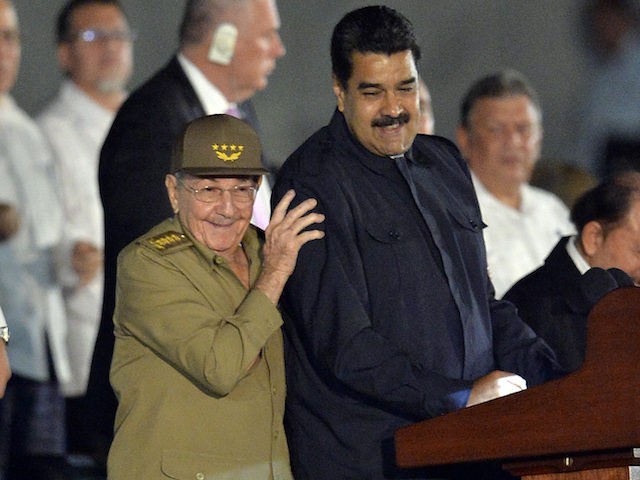Cuba has invaded and conquered Venezuela, installing tens of thousands of government agents to help the Castro regime profit from drug trafficking, alliances with terrorist groups, and theft of natural resources, the Foundation for Human Rights in Cuba revealed in a report published Friday.
Since the rise of late dictator Hugo Chávez, intelligence officials, dissidents, and foreign policy experts have warned that Chávez had formed an alliance with Cuba’s communist government enabling the latter to take control over the entirety of Venezuelan society. The Foundation for Human Rights in Cuba issued a preliminary report in 2017 revealing that current dictator Nicolás Maduro used Cuban government agents for his personal security entourage and to run the nation’s failed health care system. The report published Friday, spanning over 90 pages, compiles these allegations and expands upon them with new research exposing the full extent to which Havana has colonized Caracas.
In Cubazuela: Chronicle of a Cuban Intervention, authors Juan Antonio Blanco and Casto Ocando concluded that Cuban government agents control Venezuela’s politics, economy, healthcare infrastructure, drug trade, and ties to terrorism. Venezuela, now a “failed state,” they wrote, proves useful to deflect blame from Cuba from those who consider Venezuela a separate state from Cuba. In practice, however, the authors conclude that Venezuela and Cuba operate as one state “controlled by a transnational criminal group associated with terrorist organizations such as the FARC, the ELN and Hezbollah.” The FARC and ELN are Marxist Colombian narco-terrorist organizations known to generate much of their revenue through cocaine and other drug trafficking. The report explains:
One [service colonizing Venezuela provides to Cuba] is to outsource to Venezuela an array of criminal activities which happen to coincide with the geopolitical objectives of Cuba’s most obnoxious international allies (Russia, Iran, the FARC, the ELN, Hezbollah), This can be accomplished by transferring to Caracas the connections with drug trafficking and its logistics, and the training and provisioning connections of terrorist and “rogue” groups like the afore mentioned (ETA also made use of those facilities before it disappeared).
The report reveals that Cuba has at least 50,000 military personnel and another 45,000 “civilian” agents active in Venezuela to implement its policies, approximating (and repeating) the estimate by defecting General Antonio Rivero in 2017 that nearly 100,000 Cuban government operatives control Venezuela. According to the report:
The Cuban invasion has fluctuated between 25,000 and 50,000 military advisers for intelligence and counterintelligence, protection of personalities and police repression, as well as a large group of civilians in functions of political proselytism, ideological influence and military reserve. Said civilians have sufficient military training to regroup as armed support units in case they are ordered to do so. This invading force oversees intelligence systems, brutal paramilitary groups (such as Colectivos and the FAES), interrogation and torture centers, electronic espionage systems, as well as institutions working on ideological influence.
The soldiers, they write, have overt political objectives: maintaining loyalty by force among the military ranks, torturing civilian political dissidents, keeping drug smuggling operations believed to be led by chief lawmaker Diosdado Cabello running smoothly, and funneling Venezuelan oil and natural resources to Cuba.
They go on to describe some of the civilians – many of them doctors, engineers, and assorted “aid” workers – as “modern slaves,” a term common to describe Cuba’s use of forced medical labor to curry political favor and generate up to $11 million a year. In Venezuela, communist authorities banned Cuban slave doctors from tending to patients not know to be loyal to Maduro in March, despite the pervasive nature of the ongoing medical crisis in the country.
The authors – former government agents in Cuba and Venezuela, respectively – assert that Venezuela “has handed over national independence to Cuba, which has established there a model of modern colonial domination.” They concluded that the use of force is necessary to break the ties between Maduro and Castro and begin the process of liberating Venezuela. As the nation no longer fits the definition of a sovereign state, attacking its dictatorship would not violate international law, they claim.
Arguing that Venezuela poses a physical threat to its neighbors and other regional actors affected by drug trafficking and terrorism, the authors wrote, “The main sources of income of the criminal economy can only be decimated efficiently if military and police operations are carried out to neutralize and eradicate their laboratories, as well as to intercept the air and naval routes of drug trafficking.”
“Only this [sic] type of measures will be able to put an end to the permanent aggression against other countries posed to date by drug trafficking and the planning of terrorist attacks from Venezuelan territory,” they concluded. “Faced with this narco-state in the hands of a criminal gang, the armed defense, individual or collective, by the attacked states is legitimate.”
The United States has repeatedly expanded sanctions on the Maduro regime, most recently sanctioning state oil vessels for cooperation with Cuba. While no military action has occurred yet, President Donald Trump has repeatedly stated that all options are on the table to remove Maduro given his illegitimate status.

COMMENTS
Please let us know if you're having issues with commenting.